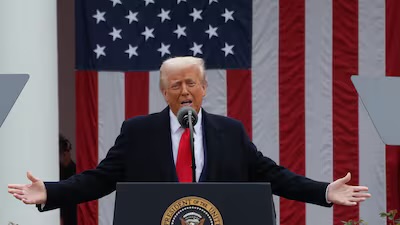US’s Reciprocal Tariffs: Impact on India’s energy, oil, and gas sectors

RoydadNaft – The imposition of US tariffs on India’s energy sector is not merely a geopolitical concern— it is a complex legal issue with broad ramifications for corporates which will increase legal discourse between corporates across the industry supply chain, observes Deepto Roy of Shardul Amarchand Mangaldas & Co.
India’s energy, oil, and gas sectors have been heavily influenced by global market dynamics, with the US and the European Union (EU) playing pivotal roles as trade partners. As India continues to be an active player in the global energy markets, any shifts in trade policies—particularly those coming from major stakeholders like the US — trigger significant changes in market dynamics, pricing, and supply chains.
The imposition of US tariffs on Indian energy exports presents both short-term and long-term challenges, requiring businesses in India’s oil and gas sectors to adopt agile strategies to mitigate risks, optimise supply chains, and remain competitive in a rapidly evolving landscape.
India has been walking a geopolitical tightrope with the purchase of Russian crude. On one hand, offering Russian crude at affordable prices is not just key for continued profitability of both public and private sector oil and gas companies but is ultimately crucial for the country’s energy security.
At the same time, India has been particularly careful in ensuring that there is no overt opposition to the US and EU led sanctions on Russian crude, particularly to not upset the growing continuously growing ties with the US. Today’s tariff announcement does not make any reference to Russian crude or products for India and therefore this will have to be monitored for the foreseeable future.
The imposition of tariffs will likely create upward pressure on the cost of Indian exports to the US energy market. Indian energy exporters would face increased tariffs on their products, leading to higher prices for US consumers and making Indian goods less competitive compared to other suppliers or exporters. As a result, demand for Indian energy products could fall, forcing companies to explore alternative markets—likely at lower prices, thereby shrinking their profit margins.
For Indian companies, such a shift could trigger overproduction or idling in the domestic market. As the supply-demand balance is disrupted, Indian energy producers may struggle to find new buyers who are willing to absorb the increased costs. This could also exacerbate the existing challenges in the domestic market, where there are already concerns about the stability and security of energy supplies.
The impact of US tariffs on supply chains threaten to be significant, particularly for companies relying on US imports / licensing for specialised technology (such as LNG regasification technologies), drilling equipment, and refining machinery from global suppliers. A rise in tariffs on these crucial supplies would inevitably increase operational costs, placing an additional burden on the energy companies already facing rising input costs. This could be particularly difficult for India’s refining sector, which does rely on US sourced technologies for operational efficiency. India’s ongoing investments in expanding pipeline networks and City Gas Distribution (CGD) systems will face budgetary constraints if procurement costs rise due to tariff-induced price hikes.
The imposition of tariffs could also trigger legal and contractual issues for companies operating in India’s energy sector, especially those engaged in long-term contracts with US suppliers. Many Indian firms rely on long-term contracts with US partners for the supply of LNG, crude oil, and technological services. If tariffs raise the cost of these goods or delay shipments, Indian firms may face difficulties in honoring the terms of their contracts.
Legal clauses such as force majeure, hardship provisions, and material adverse change clauses may be triggered, leading to disputes, high legal costs, and potential damage to reputations. Legal counsel will need to advise on strategies to mitigate risks, including renegotiating terms or pursuing alternative suppliers to ensure that operations continue smoothly despite the introduction of tariffs.
The imposition of US tariffs on India’s energy sector is not merely a geopolitical concern— it is a complex legal issue with broad ramifications for corporates which will increase legal discourse between corporates across the industry supply chain. Companies must stay ahead of these developments by assessing contract vulnerabilities, regulatory shifts, and legal remedies under international law and their individual contracts. By doing so, Indian energy companies can ensure continuity, reduce liability, and maintain investor confidence amid uncertain global trade conditions.













